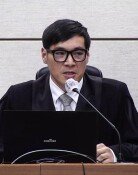[Op-Ed] Environment Special and PD Notebook
[Op-Ed] Environment Special and PD Notebook
Posted August. 10, 2009 08:21,
After controversy flared over the allegation that the KBS TV program Environment Special aired a fabricated scene, the state-run broadcaster promptly conducted an internal probe and punished those responsible. The scene in question was of an eagle owl hunting a hare in the episode Emperor of the Night: the Eagle Owl broadcast in March last year. The shows narrator said, The production team witnessed graphic scenes of an eagle owl hunting fast hares, but the team was found to have filmed the scene after tying up the legs of the hare. Suspicion over the scene was reported by the media July 23, and KBS imposed a heavy punishment on the staff responsible Friday. The penalty came 15 days after the allegation surfaced.
Viewers of Environment Special considered the scene as a moment of nature, and usually speak highly of the producers commitment and efforts. If such trust collapses, the documentarys ability to move audiences will instantly disappear. Finding the truth behind this debacle was not as easy as initially expected. The producer in charge said the BBC also used the same filming technique he used in Environment Special, saying, When the BBC shot a white shark catching and eating a seal, it also shot the scene after tying up the seal. A BBC official flatly denied this, however.
Fabricated and inaccurate reporting and distortion of news could emerge again in broadcasting anytime. What is important, however, is how a broadcaster responds when such a problem emerge. In 2004, the BBC reported that Prime Minister Tony Blair fabricated information to justify the Iraq War, something that was not true. Those in charge of the report were not only fired, even the BBC president resigned to assume responsibility. A public broadcaster must take more stern action when controversy erupts, and put itself in the shoes of the viewer rather than staff.
The facts were distorted far more in the MBC TV news magazine Producers Notebook last year than in Environment Special. Yet MBC has stubbornly sought to protect its own staff for more than a year and deny responsibility. Since the network refuses to reflect on its misdeeds, it continues to be boycotted and derided by viewers. Perhaps the new board at the Federation of Broadcast Culture, MBCs majority stakeholder, can change the deep-rooted practice of organizational selfishness at Koreas second-largest public broadcaster.
Editorial Writer Hong Chan-sik (chansik@donga.com)






![“설거지해도 그대로”…냄비 ‘무지개 얼룩’ 5분 해결법 [알쓸톡]](https://dimg.donga.com/c/138/175/90/1/wps/NEWS/IMAGE/2026/01/15/133164664.3.png)
